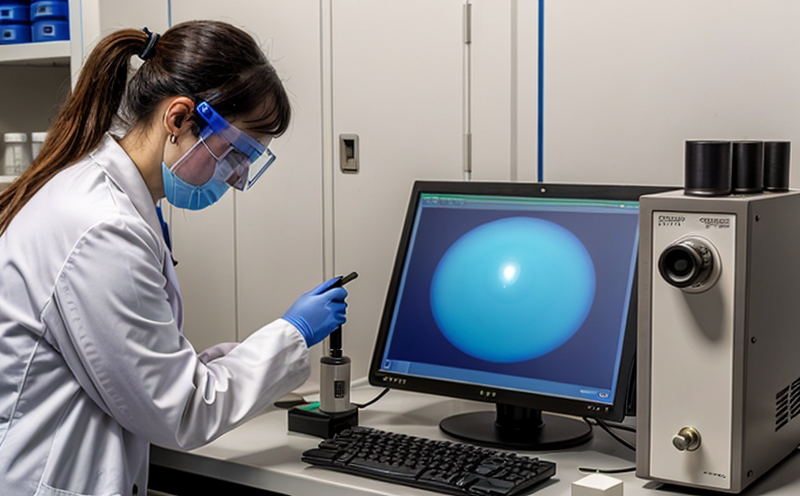ISO 17294 Inductively Coupled Plasma Mass Spectrometry Testing
The ISO 17294 standard specifies a robust methodology for inductively coupled plasma mass spectrometry (ICP-MS) analysis, which is widely used in the chemical testing sector. This technique offers unparalleled sensitivity and accuracy for trace element analysis, making it particularly useful when dealing with complex matrix samples.
The process begins with a meticulous sample preparation step, where the sample is diluted or digested to ensure that all target elements are available for detection without interference from matrix components. The prepared solution is then introduced into an inductively coupled plasma (ICP) source, which ionizes the sample into its constituent ions.
The ions produced by the ICP are then injected into a mass spectrometer where they are separated based on their mass-to-charge ratio. This separation allows for precise measurement of individual elemental species present at extremely low concentrations. The mass spectrometer's output is analyzed and interpreted using advanced software, which provides quantitative results in accordance with ISO 17294.
The key advantage of ICP-MS over other analytical techniques lies in its ability to detect elements down to parts per trillion levels, making it invaluable for quality control and compliance purposes. This level of sensitivity ensures that even the smallest trace contaminants can be identified, which is crucial in industries such as pharmaceuticals, electronics, and environmental monitoring.
The application of ISO 17294 ICP-MS testing is not limited to a single industry; it spans across various sectors including healthcare, semiconductor manufacturing, and food safety. In the pharmaceutical sector, for instance, ensuring trace element purity in drug formulations can prevent adverse reactions. For semiconductors, accurate elemental analysis helps maintain high yields during fabrication processes.
Our laboratory adheres strictly to ISO 17294 guidelines, employing experienced technicians operating state-of-the-art ICP-MS equipment. We provide comprehensive reports that include detailed methodological descriptions, raw data, and interpreted results, ensuring transparency and traceability throughout the testing process.
Why It Matters
The implementation of ISO 17294 ICP-MS testing is crucial for maintaining high standards of product quality and compliance with international regulations. By adhering to this standard, organizations can ensure that their processes meet the stringent requirements set forth by regulatory bodies.
For instance, in the pharmaceutical industry, strict adherence to ISO 17294 ensures that drug products are free from harmful trace elements, thereby safeguarding patient health and safety. In electronics manufacturing, accurate elemental analysis helps prevent defects that could lead to costly product recalls or failures.
The reliability of ICP-MS testing also extends beyond individual industries; it plays a pivotal role in environmental monitoring by detecting pollutants at very low levels. This capability is essential for regulatory compliance and public health protection.
Moreover, ISO 17294 ICP-MS testing supports ongoing research and development efforts by providing precise data that can inform new product designs or process improvements. The ability to detect minute changes in elemental composition allows manufacturers to optimize their production processes continuously.
Customer Impact and Satisfaction
Our customers benefit significantly from ISO 17294 ICP-MS testing due to its high accuracy, precision, and reliability. By leveraging this advanced analytical technique, they can achieve superior product quality and meet stringent regulatory requirements.
Quality managers appreciate the detailed reports generated by our lab, which provide comprehensive insights into their products' elemental composition. Compliance officers find reassurance in knowing that their operations adhere strictly to international standards like ISO 17294.
R&D engineers gain valuable information from these tests, enabling them to innovate and improve existing products or develop new ones. Procurement teams also benefit as they can ensure suppliers meet the necessary quality criteria before entering into contracts.
Customer satisfaction is paramount for us, which is why we strive to deliver accurate, timely results every time. Our commitment to excellence ensures that our clients trust us with their most critical testing needs.
Use Cases and Application Examples
The applications of ISO 17294 ICP-MS testing are diverse and extensive across numerous industries:
- Pharma & Biotech: Ensuring drug purity by detecting trace elements.
- Electronics: Quality control for semiconductors to prevent defects.
- Environmental: Monitoring water and soil quality for pollutant detection.
- Food & Beverage: Guaranteeing product safety through contaminant identification.
- Metalworking: Analyzing alloys to ensure correct elemental composition.
- Aerospace: Verifying component integrity by detecting trace impurities.
In each of these fields, ISO 17294 ICP-MS testing provides critical data that informs decision-making processes and drives continuous improvement initiatives. The precision offered by this technique ensures compliance with global standards while supporting innovation and safety.





